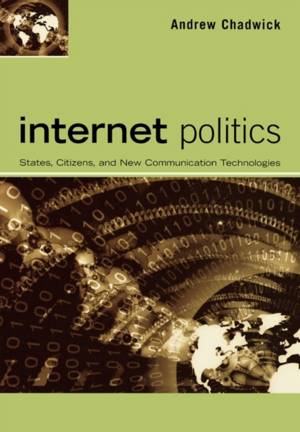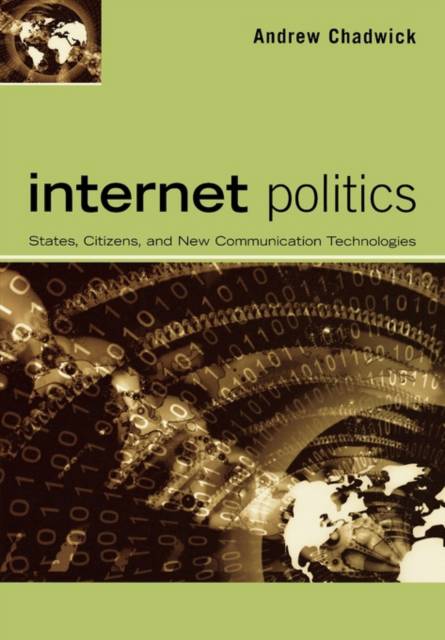
- Afhalen na 1 uur in een winkel met voorraad
- Gratis thuislevering in België vanaf € 30
- Ruim aanbod met 7 miljoen producten
- Afhalen na 1 uur in een winkel met voorraad
- Gratis thuislevering in België vanaf € 30
- Ruim aanbod met 7 miljoen producten
Zoeken
Internet Politics
States, Citizens, and New Communication Technologies
Andrew Chadwick
Paperback | Engels
€ 78,45
+ 156 punten
Omschrijving
In the developed world, there is no longer an issue of whether the Internet affects politics--but rather how, why, and with what consequences. With the Internet now spreading at a breathtaking rate in the developing world, the new medium is fraught with tensions, paradoxes, and contradictions. How do we make sense of these? In this major new work, Andrew Chadwick addresses such concerns, providing the first comprehensive overview of Internet politics.
Internet Politics examines the impact of new communication technologies on political parties and elections, pressure groups, social movements, local democracy, public bureaucracies, and global governance. It also analyzes persistent and controversial policy problems, including the digital divide; the governance of the Internet itself; the tensions between surveillance, privacy, and security; and the political economy of the Internet media sector. The approach is explicitly comparative, providing numerous examples from the U.S., Britain, and many other countries. Written in a clear and accessible style, this theoretically sophisticated and up-to-date text reveals the key difference the Internet makes in how we "do" politics and how we think about political life. A companion website, www.andrewchadwick.com, offers dynamic, regularly updated material to supplement the book, along with PowerPoint slides for students and instructors, data spreadsheets, and additional case studies. Featuring numerous figures, tables, and text boxes, Internet Politics is ideal for undergraduate and graduate courses in political science, international relations, and communication studies.
Internet Politics examines the impact of new communication technologies on political parties and elections, pressure groups, social movements, local democracy, public bureaucracies, and global governance. It also analyzes persistent and controversial policy problems, including the digital divide; the governance of the Internet itself; the tensions between surveillance, privacy, and security; and the political economy of the Internet media sector. The approach is explicitly comparative, providing numerous examples from the U.S., Britain, and many other countries. Written in a clear and accessible style, this theoretically sophisticated and up-to-date text reveals the key difference the Internet makes in how we "do" politics and how we think about political life. A companion website, www.andrewchadwick.com, offers dynamic, regularly updated material to supplement the book, along with PowerPoint slides for students and instructors, data spreadsheets, and additional case studies. Featuring numerous figures, tables, and text boxes, Internet Politics is ideal for undergraduate and graduate courses in political science, international relations, and communication studies.
Specificaties
Betrokkenen
- Auteur(s):
- Uitgeverij:
Inhoud
- Aantal bladzijden:
- 400
- Taal:
- Engels
Eigenschappen
- Productcode (EAN):
- 9780195177732
- Verschijningsdatum:
- 23/02/2006
- Uitvoering:
- Paperback
- Formaat:
- Trade paperback (VS)
- Afmetingen:
- 167 mm x 233 mm
- Gewicht:
- 585 g

Alleen bij Standaard Boekhandel
+ 156 punten op je klantenkaart van Standaard Boekhandel
Beoordelingen
We publiceren alleen reviews die voldoen aan de voorwaarden voor reviews. Bekijk onze voorwaarden voor reviews.







